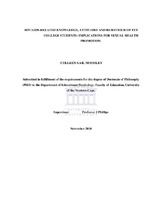| dc.contributor.advisor | Phillips, Joliana | |
| dc.contributor.author | Moodley, Colleen Gail | |
| dc.contributor.other | NULL | |
| dc.contributor.other | Faculty of Education | |
| dc.date.accessioned | 2014-01-15T07:50:41Z | |
| dc.date.available | 2011/05/30 10:32 | |
| dc.date.available | 2011/07/01 | |
| dc.date.available | 2014-01-15T07:50:41Z | |
| dc.date.issued | 2010 | |
| dc.identifier.uri | http://hdl.handle.net/11394/2560 | |
| dc.description | Philosophiae Doctor - PhD | en_US |
| dc.description.abstract | The quantitative findings indicated high levels of HIV/AIDS knowledge, self-concept and self-efficacy. Risky sexual behaviour was measured in terms of condom use and the number of sexual partners in the 12 months prior to the study with males reporting significantly more risky sexual behaviour. More males (70% vs. 43 % females) reported no condom use when engaging in sex. More males (62 % vs. 28 % females) reported having had two or more sexual partners in the 12 months prior to the study. Results also suggested that an increase in knowledge of HIV/AIDS would predict an increase in the use of condoms particularly for males. Lower self-efficacy seemed to predict an increase in the number of sexual partners for males. The focus group discussions highlighted students' views of HIV/AIDS knowledge in relation to their sexual practices, attitudes and sexual decision-making. Influences such as personal factors (self-concept and self-efficacy), social factors (e.g. peer influences, gender, and status) and environmental factors (e.g. media) were investigated. Participants also commented on the effectiveness of HIV/AIDS campaigns and the adequacy in provision of health services at college and community level. From the findings, guidelines were developed which may be used to reflect on current intervention programmes and may be considered when developing future interventions programmes, policies, or campaigns in promoting safer sexual practices amongst youth as a means of addressing the HIV/AIDS pandemic. | en_US |
| dc.language.iso | en | en_US |
| dc.publisher | University of the Western Cape | en_US |
| dc.subject | Students | en_US |
| dc.subject | South Africa | en_US |
| dc.subject | Sexual behavior | en_US |
| dc.subject | AIDS (Disease) | en_US |
| dc.subject | HIV infections | en_US |
| dc.subject | Acquired Immunodeficiency Syndrome | en_US |
| dc.title | HIV/AIDS related knowledge, attitudes and behaviour of FET College students: implications for sexual health promotion | en_US |
| dc.type | Thesis | en_US |
| dc.rights.holder | University of the Western Cape | en_US |
| dc.description.country | South Africa | |

